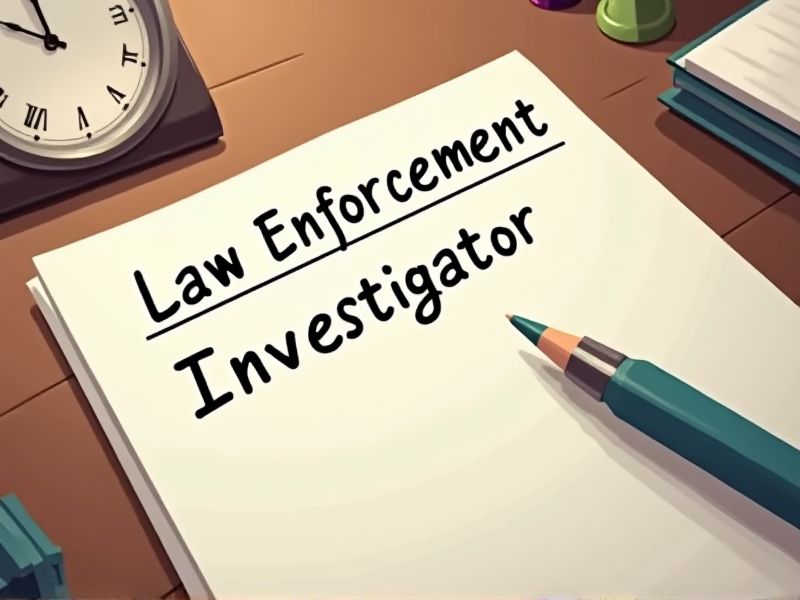
Law enforcement investigators often face complex criminal scenarios, requiring specialized knowledge to interpret and solve cases efficiently. Certain certifications provide them with skills such as crime scene analysis, digital forensics, and interview techniques, ensuring they are well-equipped to handle diverse investigative challenges. Certifications also establish a standard of professional competence, fostering trust within the community and among law enforcement entities. Here are some key certifications that could enhance your capabilities as a law enforcement investigator.
Certified Law Enforcement Investigator (CLEI)
Certified Law Enforcement Investigator (CLEI) designation results in heightened professional credibility and recognition within the law enforcement community. It ensures an investigator possesses a standardized set of competencies and knowledge essential for effective criminal investigations. CLEI certification leads to increased inter-agency collaboration by establishing a common framework. Enhanced investigative skills gained from CLEI training promote more accurate and efficient case resolutions.
Certified Criminal Investigator (CCI)
The presence of a Certified Criminal Investigator (CCI) in law enforcement enhances the rigor and precision of investigative processes due to their advanced specialized training. A CCI's expertise in evidence gathering and interpretation leads to more accurate case resolutions, reducing the chances of wrongful convictions. The credibility and authority of a CCI help in maintaining public trust in law enforcement agencies, as they ensure investigations adhere to legal and ethical standards. The systematic approach that CCIs bring can significantly boost the efficiency and effectiveness of law enforcement investigations, resulting in more successful prosecutions.
Certified Fraud Examiner (CFE)
Certified Fraud Examiners provide vital expertise in detecting and preventing financial crimes for law enforcement investigators. Their specialized knowledge in fraud investigation techniques can enhance the accuracy and efficiency of law enforcement operations. Integration of CFEs into investigative teams often results in higher rates of case resolution and successful prosecution. Without CFEs, law enforcement may lack the comprehensive understanding necessary to navigate complex fraud schemes.
Computer Hacking Forensic Investigator (CHFI)
Computer Hacking Forensic Investigators (CHFI) are crucial for law enforcement because they provide the expertise to uncover digital evidence hidden in complex cyber environments. With the rise of cybercrime, investigators need specialists who can accurately extract and interpret data from electronic devices. CHFI professionals help ensure that digital evidence is admissible in court, strengthening legal cases against cybercriminals. Their insights assist law enforcement in understanding the methods used by hackers, leading to improved cybersecurity measures.
Certified Digital Forensic Examiner (CDFE)
Law enforcement investigators need Certified Digital Forensic Examiners (CDFEs) because the rise of cybercrime requires sophisticated skills to collect and analyze digital evidence effectively. CDFEs possess the expertise to ensure digital evidence integrity, which is crucial for legal admissibility in court proceedings. The certifications validate proficiency in the latest forensic tools and techniques, vital for keeping up with evolving technology. With the growing reliance on digital data in crimes, CDFEs can bridge the knowledge gap for law enforcement in understanding complex digital crime landscapes.
Professional Certified Investigator (PCI)
Law enforcement investigators often encounter complex cases that demand specialized skills beyond standard training, and acquiring a Professional Certified Investigator (PCI) certification provides those advanced competencies. The PCI credential equips investigators with enhanced expertise in legal case management, which is crucial for navigating judicial processes and ensuring evidence integrity. Obtaining PCI certification validates an investigator's proficiency in conducting thorough investigations, which can lead to more successful case resolutions and bolster public trust in law enforcement agencies. Enhanced problem-solving skills gained through PCI training empower investigators to address a wider range of challenges effectively, which can positively impact overall community safety.
Certified Police Investigator (CPI)
Certified Police Investigators bring specialized skills that enhance the quality and efficiency of criminal investigations. Their training ensures that evidence is collected and analyzed according to stringent legal standards, reducing the risk of wrongful convictions. Consistent certification upgrades their knowledge to include new forensic technologies, leading to more accurate case resolutions. CPI designation fosters public trust by establishing a benchmark for professional competence and ethical conduct in law enforcement.
Investigative Interviewing Certification (IIC)
Law enforcement investigators equipped with an Investigative Interviewing Certification (IIC) tend to elicit more accurate and comprehensive information from subjects. This specialized training reduces the likelihood of false confessions and subsequent wrongful convictions. Certified interviewers often adhere to standardized protocols, enhancing the credibility of the investigation process. Agencies investing in IIC contribute to improved community trust and overall confidence in the justice system.
Certified Forensic Interviewer (CFI)
The Certified Forensic Interviewer (CFI) designation enhances a law enforcement investigator's skills in conducting ethically sound and legally defensible interviews. Specialized training in forensic interviewing methods improves the reliability and accuracy of information gathered from witnesses and suspects. CFI-certified investigators help reduce false confessions and protect the integrity of investigations. This certification increases professional credibility and can lead to higher case clearance rates.
Certified Homeland Security Professional (CHSP)
The complexity of modern security threats necessitates that law enforcement investigators possess specialized skills, which the Certified Homeland Security Professional (CHSP) certification provides, to effectively assess and mitigate potential risks. A CHSP equips an investigator with a deep understanding of intelligence analysis, enabling more precise identification of emerging threats and vulnerabilities. The certification fosters collaboration through standard practices and protocols, enhancing interoperability among various agencies. This professional credentialing instills confidence, allowing investigators to maneuver complex security environments with expertise and credibility.
Summary
As a reader with interest in law enforcement, obtaining certifications can elevate an investigator's skills and credibility. This enhances the ability to tackle complex investigations with a structured approach. Certified investigators often gain access to specialized tools and resources unavailable to non-certified personnel. Collaboration and trust with other agencies typically improve, leading to more effective case resolutions.
